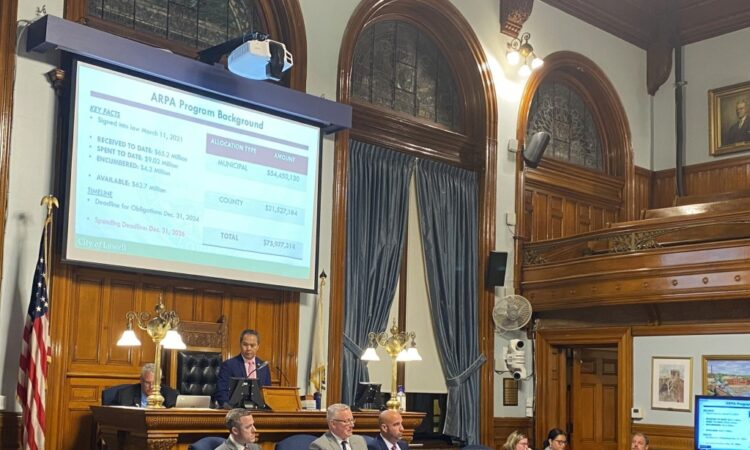
LOWELL — City Manager Tom Golden checked several items off his extensive to-do list in Tuesday night’s City Council meeting.
But the biggest item on his list – and the biggest item of the night – was his presentation to the Council on the American Rescue Act Plan funding for the city.
Golden called the money a “once-in-a-lifetime opportunity” to reinvest in the city and its residents.
“This spending plan builds the foundation for a better city for generations to come,” he said. “And of an equitable recovery for all.”
The $79.5 million spending plan includes investments in the key areas of:
- $13.4 million in funding to various social-impact programs
- $10 million for apparatus replacement in the Lowell Fire Department
- $9 million to fund the Lowell Neighborhood Improvement Plan
- $7 million for improvements to municipal buildings
- $10.6 million for improvements to the city’s water and sewer system
- $5.8 million for economic development and recovery
- $4.6 million to support local nonprofits
- $5.6 million in public health, premium pay and compliance
To date, a little more than $9 million has already been spent mostly in the area of COVID mitigation, training and immediate supports, with the remaining $4.2 million encumbered in various programs.
ARPA was signed into law by President Biden in March 2021. The deadline for obligations, in which contracts are executed for the disbursement of funds, is Dec. 31, 2024. The spending deadline for ARPA funds is Dec. 31, 2026.
“The goal,” Golden told the Council, “is to get this money on the streets as soon as possible.”
The detailed breakdown was the result of three community listening sessions held in May. More than 200 residents attended events at the Lowell YMCA, Boys & Girls Club and the Lowell Senior Center.
Additionally, Golden and his team – Chief Financial Officer Conor Baldwin, ARPA Finance Manager Brendan Flynn, Executive Assistant Nancy McGovern – as well as department heads, the City Councilors and other community stakeholders, all contributed to determining the funding categories that Golden called a “working, breathing document.”
At $13.4 million, the social impact program is the largest funding category, and reflects the historic motion unanimously passed by the Council in June declaring that “Racism is a public health crisis.”
To address that health crisis, the motion called for the city to make investments in four key areas: public health, education and training, socioeconomic equity, and generational wealth-building opportunities.
Almost $9 million of the social impact program is allocated to those areas making racism as a public health crisis the biggest allocation within the biggest category of the ARPA funding.
Replacing the Lowell Fire Department’s aging fleet is the second biggest allocation at $10 million. Chief Phillip Charron attended the meeting along with a dozen firefighters, who left mid-meeting to respond to a call.
In an earlier motion response, the chief outlined the dire condition of the 43-vehicle fleet, noting that the average age of the department’s equipment is 15 to 16 years. The industry’s National Fire Protection Association standards recommend apparatus replacement at the 15-year mark.
“Over the last two decades, vehicles have not been replaced at the rate required to keep the fire department within a reasonable lifespan,” Charron wrote. “This has led to apparatus and support vehicles spending more time under repair, which takes the vehicle out of service for multiple weeks.”
Recently, the department had to depend on a loaner truck from the Dracut Fire Department due to the firehouse truck being under repair.
Charron pointed to both fire response times and firefighter safety as the main driver to accelerating the replacement schedule through ARPA funding.
Golden said the money invested in the social impact and safety programs like the fire department shows “our overall commitment to help our residents to live a better life.”
In recent months, Golden has methodically been addressing the councils’ concerns on a wide variety of issues. The administration teamed with Middlesex Community College to bring diversity, equality and inclusion training to the city’s leadership. The 16-hour DEI certificate program is already underway. The training builds out Golden’s ongoing work in the public health piece of creating a more equitable Lowell.
He announced that Maura Fitzpatrick is the new director of homeless initiatives, a position that has been vacant since last November. Fitzpatrick comes on board at a time when the needs of the unhoused exceeds the services, support and housing resources in the community. Her position, under Director Health & Human Services Lisa Golden’s purview, will oversee a $1 million expansion of the department’s co-op team services to address homelessness, and other issues such as substance abuse.
Under his leadership, which started in April, the city manager has cut city hall vacancies from almost 70 positions to around 40, with about half of those positions awaiting confirmation.
After a two-year hiatus due to the pandemic, Golden spared no expense in preparing the city for the return of its crown-jewel summer event, the Folk Festival. Storefront windows and lightposts were painted. Welcome signs were spruced up. Streets were swept and garbage cans emptied. All was readied to make the city shine. Hundreds of thousands of people from all over the region attended the 35th festival.
In July, he announced that the city had reached a deal to sell LeLacheur Park to UMass Lowell for $1 million. The agreement capped months of negotiations, and affirmed his reputation as a deal-maker.
The council passed acceptance of the report, meaning that money can start flowing as needed almost immediately. Golden jokingly told Charron to start making calls to place the orders for his new trucks.
“I’m looking forward to ongoing conversations with councilors,” Golden said in closing, thanking them for their partnership in the funding process. “This funding will catch us up in critical areas in order that we can move forward.”






